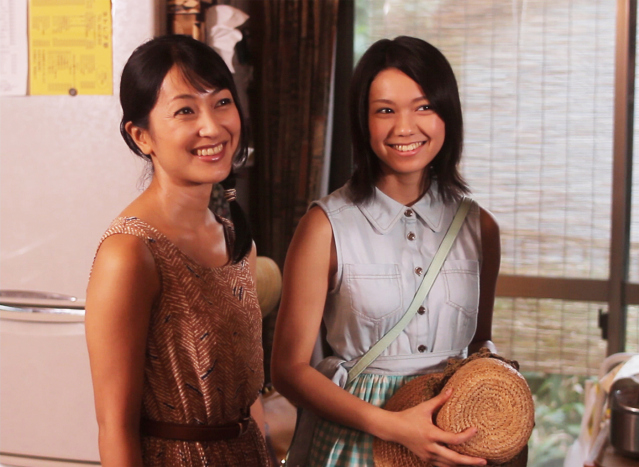Directed by Koji Fukada
Watch Au revoir l’été on FilmDoo
Any discussion of Koji Fukada’s affecting new drama, Au revoir l’été, will inevitably involve a comparison to the late great Eric Rohmer. Shadows of the French director’s 1983 picture, Pauline at the Beach, are especially evident in Fukada’s story, setting and characterisations. Less likely to come up in discussions is just how difficult it actually is to evoke this director as an influence. Rohmer was a filmmaker of such nuanced sensibilities that to even be called a cheap imitator of his style would be a backhanded compliment. Fukada’s film, however, is better than a cheap imitation, reworking Rohmer’s complex manner of depicting human behaviour within a fresh, socially aware context. Au revoir l’été isn’t retro. It’s alive, full of youth and inherently modern.
Fumi Nikaido plays Sakuko, a good-natured 18-year-old who, after failing her university entrance exams, visits her aunt Mikie (Mayu Tsuruta) at a quiet seaside town, hoping that the ostensibly peaceful environment will be an ideal setting to study for her retakes. It isn’t long before she finds herself to be a partaker in a secretive tangle of attractions involving Mikie, Mikie’s ex-boyfriend Ukichi (Kanji Furutachi), Ukichi’s student daughter (Kiki Sugino), a seemingly shy married academic (Takashi Ohtake), an adolescent Fukushima refugee named Takashi (Taiga) and the socially active young woman Takashi has a crush on. The film’s original Japanese title is Hotori no sakuko, which roughly translates to ‘Sakuko on the margin’, and it’s from the position of the margin that the titular Sakuko is given a unique, if incomplete view of the unusual, often sexually motivated goings-on in the town. Fukada undermines institutions via such devices as Ukichi’s ‘love’ hotel, where powerful men book rooms to meet up with underage girls. One uncomfortable scene even sees refugee Takashi disclose that he hated his hometown of Fukushima before the nuclear disaster and couldn’t wait to get away.

Fukada contrasts his unfortunate truths with his pretty, carefully composed, green-dominated visuals that carry a genuine feeling of whimsy to counteract the film’s darker undertones. The leisurely pace provides plenty of time for the viewer to soak in the warmly melancholic atmosphere, supported by the cast’s naturalistic performances. The dialogue is similarly organic in its meandering flow. Through the light touches that steer his conversations, Fukada expresses the sensitive and awkward sides of people that cinema rarely captures convincingly. Sakuko makes for an intriguing protagonist, not just because of Nikaido’s likeable turn, but also because she is written with a delicacy that implies unseen dimensions. It’s refreshing to find a character whose entire personality can’t be laid out in one or two scenes.
By the time Sakuko leaves the peculiar town, it is clear that something has been learned from her experiences but it’s debatable just what. This is not one of those teen films where the young lead makes a complete transition into adulthood over the course of a single summer. Revelations ripen imprecisely, and at a pace that’s true to life. This holiday, for Sakuko, is probably not life-changing – at least not in the immediate ways which we would generally associate with that term – but it feels like a partial awakening. If you’ll permit me to make a Rohmer comparison one more time, Au revoir l’été doesn’t quite achieve the balance of that director’s best works between realistic ambiguity and profoundly defined thematic content, leading to the drama occasionally feeling a little thin. Still, if the film’s flawed, at least it’s flawed in the right direction. Contemporary cinema could certainly do with more visually involving, conversational dramas that emphasise place over plot. Au revoir l’été fills this position with ease and leaves the viewer with a pleasant aftertaste and a vividly drawn community to occupy space in their memory.
Watch Au Revoir L’été at FilmDoo now (UK & Ireland only)
Find more Japanese films here.




